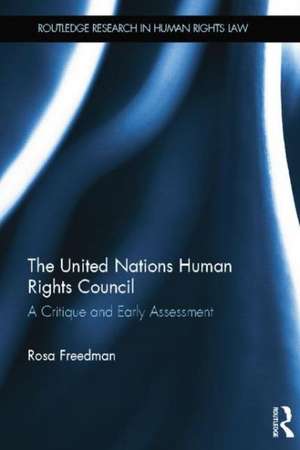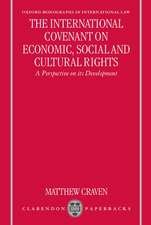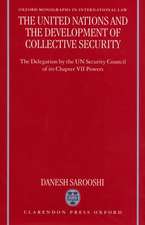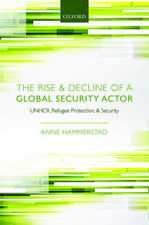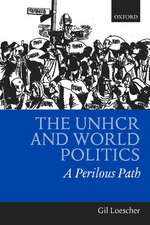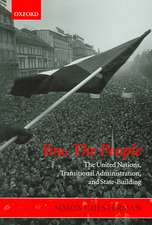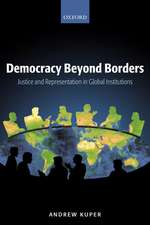The United Nations Human Rights Council: A Critique and Early Assessment: Routledge Research in Human Rights Law
Autor Rosa Freedmanen Limba Engleză Paperback – 27 apr 2015
This book examines the creation and formative years of the United Nations Human Rights Council and assesses the extent to which the Council has fulfilled its mandate. International law and theories of international relations are used to examine the Council and its functions. Council sessions, procedures and mechanisms are analysed in-depth, with particular consideration given to whether the Council has become politicised to the same extent as the Commission. Whilst remaining aware of the key differences in their functions, Rosa Freedman compares the work of the Council to that of treaty-based human rights bodies. The author draws on observations from her attendance at Council proceedings in order to offer a unique account of how the body works in practice.
The United Nations Human Rights Council will be of great interest to students and scholars of human rights law and international relations, as well as lawyers, NGOs and relevant government agencies.
| Toate formatele și edițiile | Preț | Express |
|---|---|---|
| Paperback (1) | 371.64 lei 6-8 săpt. | |
| Taylor & Francis – 27 apr 2015 | 371.64 lei 6-8 săpt. | |
| Hardback (1) | 1061.84 lei 6-8 săpt. | |
| Taylor & Francis – 15 mar 2013 | 1061.84 lei 6-8 săpt. |
Din seria Routledge Research in Human Rights Law
-
 Preț: 327.55 lei
Preț: 327.55 lei -
 Preț: 309.90 lei
Preț: 309.90 lei -
 Preț: 328.25 lei
Preț: 328.25 lei -
 Preț: 386.21 lei
Preț: 386.21 lei - 8%
 Preț: 388.56 lei
Preț: 388.56 lei -
 Preț: 312.02 lei
Preț: 312.02 lei - 20%
 Preț: 268.89 lei
Preț: 268.89 lei -
 Preț: 311.18 lei
Preț: 311.18 lei -
 Preț: 384.91 lei
Preț: 384.91 lei -
 Preț: 327.10 lei
Preț: 327.10 lei -
 Preț: 326.49 lei
Preț: 326.49 lei - 9%
 Preț: 936.56 lei
Preț: 936.56 lei -
 Preț: 318.31 lei
Preț: 318.31 lei -
 Preț: 341.55 lei
Preț: 341.55 lei - 18%
 Preț: 1167.58 lei
Preț: 1167.58 lei - 18%
 Preț: 1058.38 lei
Preț: 1058.38 lei - 18%
 Preț: 1058.65 lei
Preț: 1058.65 lei - 18%
 Preț: 1056.28 lei
Preț: 1056.28 lei - 26%
 Preț: 822.34 lei
Preț: 822.34 lei - 18%
 Preț: 1168.40 lei
Preț: 1168.40 lei - 25%
 Preț: 823.63 lei
Preț: 823.63 lei -
 Preț: 473.88 lei
Preț: 473.88 lei - 18%
 Preț: 1110.92 lei
Preț: 1110.92 lei - 26%
 Preț: 847.31 lei
Preț: 847.31 lei -
 Preț: 369.73 lei
Preț: 369.73 lei -
 Preț: 464.16 lei
Preț: 464.16 lei - 18%
 Preț: 1169.97 lei
Preț: 1169.97 lei - 25%
 Preț: 824.17 lei
Preț: 824.17 lei - 18%
 Preț: 1117.88 lei
Preț: 1117.88 lei - 18%
 Preț: 1057.57 lei
Preț: 1057.57 lei - 18%
 Preț: 1061.06 lei
Preț: 1061.06 lei - 18%
 Preț: 1111.58 lei
Preț: 1111.58 lei - 18%
 Preț: 1057.75 lei
Preț: 1057.75 lei - 18%
 Preț: 1109.18 lei
Preț: 1109.18 lei - 18%
 Preț: 1061.57 lei
Preț: 1061.57 lei -
 Preț: 475.16 lei
Preț: 475.16 lei - 18%
 Preț: 1059.48 lei
Preț: 1059.48 lei - 18%
 Preț: 1060.52 lei
Preț: 1060.52 lei -
 Preț: 414.32 lei
Preț: 414.32 lei - 18%
 Preț: 1053.92 lei
Preț: 1053.92 lei -
 Preț: 423.30 lei
Preț: 423.30 lei
Preț: 371.64 lei
Nou
Puncte Express: 557
Preț estimativ în valută:
71.12€ • 74.50$ • 58.94£
71.12€ • 74.50$ • 58.94£
Carte tipărită la comandă
Livrare economică 08-22 aprilie
Preluare comenzi: 021 569.72.76
Specificații
ISBN-13: 9781138828896
ISBN-10: 1138828890
Pagini: 344
Dimensiuni: 156 x 234 x 20 mm
Greutate: 0.5 kg
Ediția:1
Editura: Taylor & Francis
Colecția Routledge
Seria Routledge Research in Human Rights Law
Locul publicării:Oxford, United Kingdom
ISBN-10: 1138828890
Pagini: 344
Dimensiuni: 156 x 234 x 20 mm
Greutate: 0.5 kg
Ediția:1
Editura: Taylor & Francis
Colecția Routledge
Seria Routledge Research in Human Rights Law
Locul publicării:Oxford, United Kingdom
Public țintă
PostgraduateCuprins
Part 1: The Human Rights Council’s Mandate 1. Background: From Commission to Council 2. Reforming the UN Principal Charter-Based Human Rights Body 3. Creation and Mandate Part 2: Criteria for Assessing the Council 4. International Relations Theories 5. Roles and Functions of International Organisations 6. Politicisation of International Organisations 7. The United States and the Human Rights Council 8. The Council’s Inaction on Darfur 9. Innovative Mechanisms 10. Conclusion
Recenzii
[Rosa Freedman] does not allow geopolitical considerations or regional alliances to get in the way. Her approach resembles that of such leading non-governmental bodies as Amnesty International and Human Rights Watch.- Aryeh Neier, Open Society Foundations, for Journal of Cold War Studies (Vol. 16, No. 1, 2014)
“In 2006, the UN was compelled to wind up its thoroughly discredited Commission on Human Rights, which was replaced by a Human Rights Council. But hopes that the council would not repeat the politically driven failures of the commission have been dashed. Freedman tells us why this is. It is a depressing story, superbly told.” - Geoffrey Alderman, University of Buckingham, for The Times Higher Education (10 July 2014)
“In 2006, the UN was compelled to wind up its thoroughly discredited Commission on Human Rights, which was replaced by a Human Rights Council. But hopes that the council would not repeat the politically driven failures of the commission have been dashed. Freedman tells us why this is. It is a depressing story, superbly told.” - Geoffrey Alderman, University of Buckingham, for The Times Higher Education (10 July 2014)
Descriere
This book examines the creation and formative years of the United Nations Human Rights Council which was created in 2006 to replace the UN Commission on Human Rights. The book assesses the extent to which the Council has fulfilled its mandate. International law and theories of international relations relating to international organizations are used to examine the Council and its functions. Council sessions, procedures and mechanisms are analysed in depth and particular consideration is given to whether the Council has become politicised to the same extent as the Commission.
